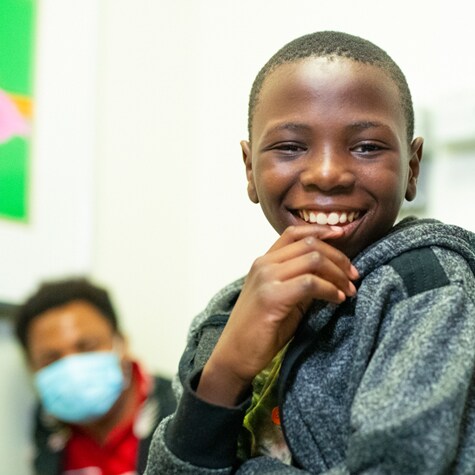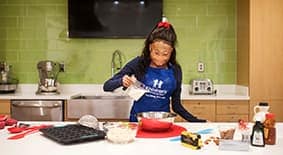Bringing Awareness to Sickle Cell Disease
At just 13 years old, Dontavious is advocating for sickle cell disease, wanting to increase awareness about the condition in his community.

“With sickle cell disease, it’s all about self-care,” Dontavious says. “If you don’t take care of your body, then you can end up sick or in the hospital. Drink water, eat fruits and vegetables, and just try to stay healthy.”
When Dontavious was 1 year old, he was admitted to Children’s Healthcare of Atlanta due to some health issues, his mother, Shalonda Newell, explains. A few days later, he was diagnosed with sickle cell disease.
“I was shocked because it had not shown up on his newborn screenings or during any of his doctor appointments,” Shalonda says. “We had also recently lost a cousin to sickle cell disease, so it was very emotional.”
Sickle cell disease is a genetic blood disorder that affects hemoglobin in red blood cells. Hemoglobin is a protein that carries oxygen to all parts of the body. Normal red blood cells are round and smooth. In a child with sickle cell disease, red blood cells are hard, sticky and shaped like a crescent, or sickle, and can lead to medical complications since they do not flow well throughout the body.
Dontavious was immediately sent to the Aflac Cancer and Blood Disorders Center of Children’s to receive treatment and care for sickle cell disease. The team explained what his family could expect for the future—such as pain crises—and provided resources to help Shalonda understand what having a child with sickle cell disease would be like.
“The most frequent problem people experience with sickle cell disease is pain,” explains Beatrice E. Gee, MD, Medical Director of the Aflac Cancer and Blood Disorders sickle cell program. “We want to make sure people are doing what is needed to prevent pain, though, such as avoiding stress, not playing too hard, getting enough sleep, drinking enough water and making sure they don’t get too cold after being in water. Medications can also be prescribed to help manage pain.”
The Aflac Cancer and Blood Disorders Center treats more than 2,000 children with sickle cell disease annually, making it the largest center of its kind in the country.
“Dontavious has been to the hospital more than 100 times since his diagnosis, and he’s had several serious complications from sickle cell disease,” Shalonda says. “His spleen and tonsils were removed, and he’s had some issues with chest pain and breathing.”
But, Children’s has continued to be a blessing to her family, Shalonda adds. “Children’s treats Dontavious like he’s one of their babies, and that’s how you want your child to be treated.”

Home to one of the largest pediatric hematology programs in the country
When the side effects of sickle cell disease keep kids from doing the things they love, our team of specialists is there to provide the comprehensive care and advanced therapies they need to get back to the childhoods they deserve.
Get InformedKids With Chronic Illness Living Life to the Fullest
Contact Us 404-785-1200


